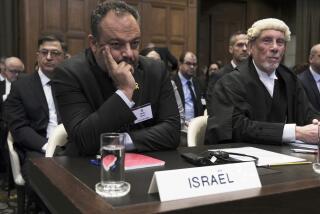Milosevic Complains of Bias; Genocide Indictment to Come
- Share via
THE HAGUE — Former Yugoslav President Slobodan Milosevic clashed with U.N. war crimes tribunal judges Thursday, complaining of discrimination and isolation in prison. Minutes later, prosecutors announced that they will indict him on charges of genocide.
During a combative 45-minute hearing, the former leader said he is so closely watched that he has not been able to speak in private to his lawyers, his wife or even his 2 1/2-year-old grandson, Marko, who visited him on his 60th birthday.
The hearing was the second face-off in as many months between the strongman who ran Yugoslavia through 13 years and four wars and the no-nonsense British presiding judge who repeatedly cut Milosevic off and insisted that the courtroom would not be a platform for political harangues.
Milosevic faces four counts of war crimes in the 1999 slayings and persecution of ethnic Albanians in Kosovo, a province of Serbia, the dominant republic of Yugoslavia. He was transferred to The Hague by Serbian authorities June 28.
Carla Del Ponte, chief prosecutor at the International Criminal Tribunal for the Former Yugoslavia, said she will file new indictments against Milosevic on Oct. 1 for crimes that occurred in Bosnia-Herzegovina and Croatia in the first half of the 1990s, including a genocide charge for Bosnia. Those indictments will be combined with the Kosovo charges, and Milosevic will probably go to trial in the fall of 2002, she said.
“We will issue an indictment for genocide in Bosnia, possibly Croatia,” Del Ponte told journalists.
In the courtroom, Milosevic called the tribunal a “political tool” that lacked jurisdiction. He charged the tribunal with discrimination and keeping him from meeting confidentially with his family and legal advisors.
“Why I am isolated from the persons who would like to see me?” Milosevic asked Judge Richard May. “I have the right to communicate.”
May gave Milosevic more freedom to speak than before but shut down the microphone when the defendant went off on tangents. “We are not going to listen to these political arguments,” he said.
May reminded Milosevic that he will be granted the right to confidentiality with attorneys if he appoints formal representation. He agreed to “look into the matters” of detention raised by the former president.
Milosevic stuck to his lone defense approach and refused to appoint an attorney.
The three-judge panel appointed a “friend of the court” to ensure that Milosevic’s legal rights are protected. But it turned down a request by the prosecution to appoint a defense attorney, saying it was Milosevic’s right to defend himself.










